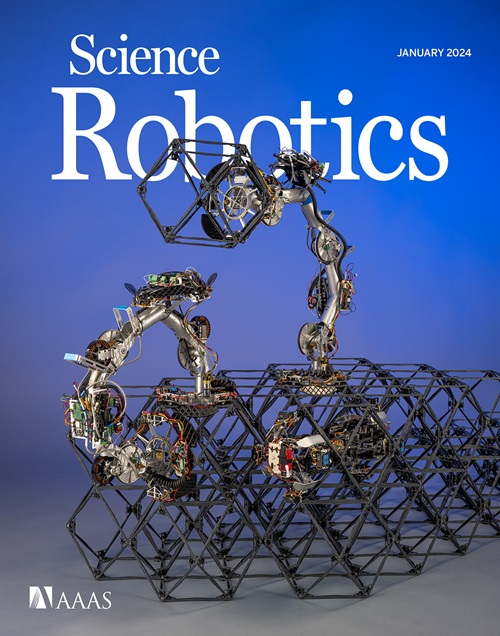学习轮足机器人的鲁棒自主导航和运动能力
IF 26.1
1区 计算机科学
Q1 ROBOTICS
引用次数: 0
摘要
自主轮足机器人有可能改变物流系统,提高运营效率和对城市环境的适应性。然而,在城市环境中导航对机器人提出了独特的挑战,需要创新的运动和导航解决方案。这些挑战包括需要在不同地形上进行自适应运动,以及在复杂的动态障碍物周围进行有效导航的能力。这项工作引入了一个完全集成的系统,包括自适应运动控制、移动感知本地导航规划和城市内大规模路径规划。利用无模型强化学习(RL)技术和特权学习,我们开发了一种多功能运动控制器。该控制器能在各种崎岖地形上实现高效、稳健的运动,并能在步行和驾驶模式之间平稳过渡。它通过分层 RL 框架与学习型导航控制器紧密结合,能够在具有挑战性的地形和各种障碍物中高速有效地导航。我们的控制器被集成到一个大型城市导航系统中,并通过在瑞士苏黎世和西班牙塞维利亚进行的千米级自主导航任务进行了验证。这些任务证明了系统的鲁棒性和适应性,强调了集成控制系统在复杂环境中实现无缝导航的重要性。我们的研究结果证明了轮足机器人和分层 RL 用于自主导航的可行性,这对最后一英里配送及其他领域具有重要意义。本文章由计算机程序翻译,如有差异,请以英文原文为准。
Learning robust autonomous navigation and locomotion for wheeled-legged robots
Autonomous wheeled-legged robots have the potential to transform logistics systems, improving operational efficiency and adaptability in urban environments. Navigating urban environments, however, poses unique challenges for robots, necessitating innovative solutions for locomotion and navigation. These challenges include the need for adaptive locomotion across varied terrains and the ability to navigate efficiently around complex dynamic obstacles. This work introduces a fully integrated system comprising adaptive locomotion control, mobility-aware local navigation planning, and large-scale path planning within the city. Using model-free reinforcement learning (RL) techniques and privileged learning, we developed a versatile locomotion controller. This controller achieves efficient and robust locomotion over various rough terrains, facilitated by smooth transitions between walking and driving modes. It is tightly integrated with a learned navigation controller through a hierarchical RL framework, enabling effective navigation through challenging terrain and various obstacles at high speed. Our controllers are integrated into a large-scale urban navigation system and validated by autonomous, kilometer-scale navigation missions conducted in Zurich, Switzerland, and Seville, Spain. These missions demonstrate the system’s robustness and adaptability, underscoring the importance of integrated control systems in achieving seamless navigation in complex environments. Our findings support the feasibility of wheeled-legged robots and hierarchical RL for autonomous navigation, with implications for last-mile delivery and beyond.
求助全文
通过发布文献求助,成功后即可免费获取论文全文。
去求助
来源期刊

Science Robotics
Mathematics-Control and Optimization
CiteScore
30.60
自引率
2.80%
发文量
83
期刊介绍:
Science Robotics publishes original, peer-reviewed, science- or engineering-based research articles that advance the field of robotics. The journal also features editor-commissioned Reviews. An international team of academic editors holds Science Robotics articles to the same high-quality standard that is the hallmark of the Science family of journals.
Sub-topics include: actuators, advanced materials, artificial Intelligence, autonomous vehicles, bio-inspired design, exoskeletons, fabrication, field robotics, human-robot interaction, humanoids, industrial robotics, kinematics, machine learning, material science, medical technology, motion planning and control, micro- and nano-robotics, multi-robot control, sensors, service robotics, social and ethical issues, soft robotics, and space, planetary and undersea exploration.
 求助内容:
求助内容: 应助结果提醒方式:
应助结果提醒方式:


